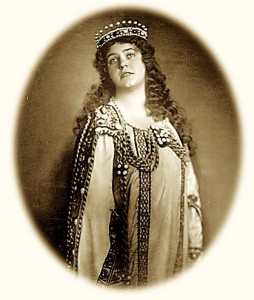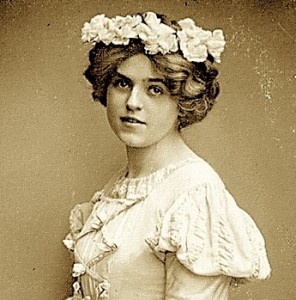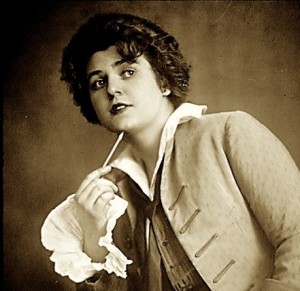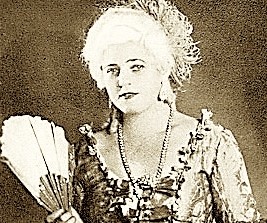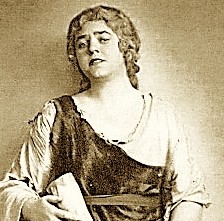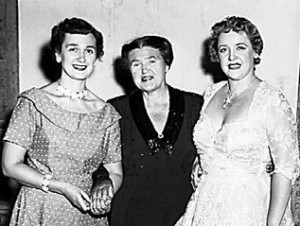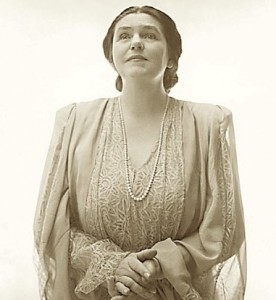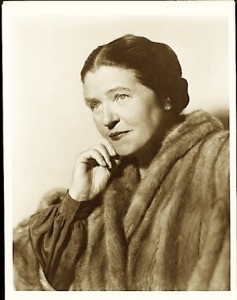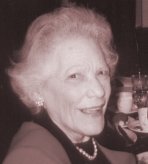On another page you may find articles from Time and Life magazines. For reviews and what some famous people have written or said about Lehmann, go to: Praise and…. Also, you can read what her friend and traveling companion, Herman Schornstein wrote in his article “From Fan to Friend.” And Judy Sutcliffe wrote an extensive piece on the Lehmann Centennial at the Vienna Opera. One of Lehmann’s major biographers, Beaumont Glass, writes about meeting and working with her.
Besides the late J.B. Steane, you’ll find below, Lehmann-related articles by Nigel Douglas, Neville Cardus, Michael Scott, Eleanor Steber, Bruce Herman, Dorothy Warenskjold, Sherman Zelinsky, Ron Murdock, Carleton Elliott, Jane Birkhead, Natalie Limonick, Rainer Lotz, Shirley Sproule and others.
In The Grand Tradition, Seventy Years of Singing on Record: 1900 to 1970, by J. B. Steane, there are many detailed, opinion-filled pages which mention Lehmann, but the chapter called “Lieder, More than Singing” ( a play on Lehmann’s book title) deals with Lehmann extensively. He can find fault: “Wolf’s ‘Auch kleine Dinge’ is much too strongly voiced for the fragility of both sound and sense.” Auch kleine Dinge But he generally praises: “. . . there surely never was an operatic artist with more of the natural feeling for the ways in which a phrase can be made meaningful and vivid, through the detailed, imaginative care for words.” On Lehmann’s recording of the “Liebestod” from Wagner’s Tristan und Isolde, Steane rhetorically questions, “Has one ever heard an Isolde who so tenderly mirrors the smile she sees in the dead face, or who rises quite so humanly to the great climaxes?” Mild und leise Finally, he writes, “It requires a remarkable, complete artist to bring such unlike forces together [opera and Lieder]; and it is not surprising that Lotte Lehmann should have been the one…preeminently to do it.”
In Legendary Voices by Nigel Douglas, Douglas writes that Lehmann was “described again and again as ‘a soul that sings’, an artist whose every performance was a creation of the moment, fetched as a new and living experience from somewhere deep within herself. These are not qualities which are easily projected onto a gramophone record, and in her recordings something of the spell which Lehmann used to cast upon live audiences is inevitably lost. It was also not a help that her early recording contracts… were with German companies which did not at that time aspire to the same technical level as those in London or New York. Despite all these caveats, however, several of the Lehmann CDs do succeed in bringing out a far more immediate and accessible timbre than I ever managed to extract from the old Parlophone 78s.” He then goes on to analyze in great detail many CDs including RCA Victor’s GDS7809. “She proves that as late as 1947 she was still quite capable of sustaining a line as taxing as Schubert’s in Nacht und Träume but it is not to prove that point that she sings the song, it is to wrap around her listeners the mood of external tranquility and internal longing, which the poem and the music engender.”
Eighteen Song Cycles: Studies in Their Interpretation, by Neville Cardus (a foreword to her book)
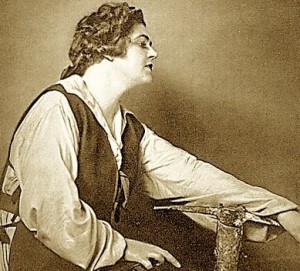
In opera Lotte Lehmann was not so much a singer who could act but, rather, a great protean actress who could sing with a voice richly engaging the ear and, by its range of colour and inflection, arresting to the sense of theatre and to the histrionic imagination. In the beginning was, for Lehmann, the word, the deed, the scene, the personal presence. She was not an opera singer who, for various parts, disguised herself externally as Sieglinde, Leonore, the Marschallin and the rest; she identified herself with each part, became as though transfused, blood and mind, into the part. She was not just a ‘character’ actress, drawing a blank cheque on our preconceptions. Her range was wide; she personified Sophie, Oktavian and the Marschallin over the years in Der Rosenkavalier. She was Rosalinde in Die Fledermaus to the vivacious essence of Rosalinde; she was Leonore in Fidelio, living image of “das ewig Weibliche.” She ranged through the entire gamut of emotion.
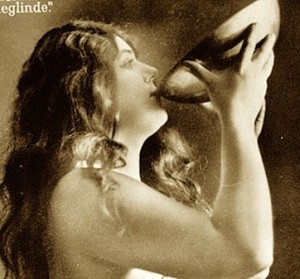
As she came on the darkened stage at the beginning of Act I of Die Walküre, and saw the exhausted Siegmund lying prone, and whispered: “Ein fremder Mann,” we could almost hear the heart of Sieglinde beating. She leaned forward, the whole woman of her expressing curiosity, apprehension and—also— an intuitive, prophetic sympathy, an unaware sister-love. I recall with vivid return of reality her marvelous moment when Sieglinde says: “Hush! Let me listen to thy voice. I heard it as a child.”—(“O, still! Lass mich der Stimme lauschen; mich dünkt, ihren Klang hört’ ich als Kind.”). The voice of Lehmann passed almost into silence as she sang “hört’ ich als Kind”; we could feel her mind going back in time and listening within itself for long-forgotten tendernesses. Then Lehmann gave a quick gasp of ecstasy, and her “doch nein!” caught at our heartstrings.
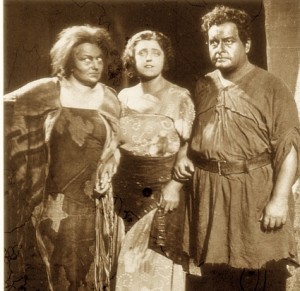
As the Dyer’s Wife in Die Frau ohne Schatten of Strauss, she mingled a poignant sympathy with her conception of the woman’s discontent and sexual self-flagellation. As the Marschallin she was all tight-lipped resignation as she pronounced the word “Vorbei!” As the Marschallin, in Act I, she was a young girl again, laughing capriciously when the unexpected intruder is not the Feldmarschall, her husband, but merely a visitor. “Es ist ein Besuch!” The waltz phrases in the music became incarnate in Lehmann; the whole woman of her danced. At a rehearsal of Fidelio Toscanini found himself transfixed by Lehmann, and he temporarily, for a split minute, forgot his sway over the orchestra, and everybody else. He actually relaxed his baton and cried out to Lehmann: “You are an artist!” It was not Toscanini’s custom to bandy words and compliments with opera singers.
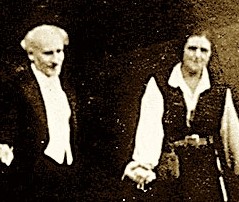
She was the artist whose style was the woman herself, a richly natured woman, sensitive and fine-minded and civilized. She is still Lehmann, the fully realized woman, stored with experience, afflicted by physical pain, philosophical and endowed with healing humour. Herself, she is a gifted writer of poetry, and a painter. What is bred in the bone comes out even in an opera singer. Her love of words was a potent factor of her artistic appeal, as I have already hinted. The imperishable stuff of Lehmann is preserved in one of her verses:
| So hört’ ich wieder deiner Stimme Ton, Die einst mein Herz erzittern machte . . . Ich lachte Ob der versunknen Illusion. Wie seltsam: ich versteh’es kaum Dass dieser schien der einzig Eine . . . und doch: ich weine Um einen toten Traum. | And I heard again the sound of your voice which once made my heart tremble . . . I laughed at the lost illusion. How strange: I can scarce realize that he seemed to me the only one . . . And yet, I weep over a dead dream. |

As a Lieder singer she did not consistently satisfy the purists. She enlarged the canvas. Her interpretation of “Erlkönig” rendered as much homage to Goethe as to Schubert. Myself, I had the same embracing experiences at a Lehmann Lieder recital as at her opera reincarnations. In this book she bestows on us her harvestings—enriching, I think, not only to students of Lieder but to the oldest of music lovers. It is wise, wiser maybe than she knows. It teaches to the purist, insists on the individuality of the learner. But, more rewarding still, it is a book which reflects and sustains our impressions, our devotion to and admiration of, Lotte Lehmann. Anyhow, I speak for myself. – NEVILLE CARDUS, London, June, 1971
Lotte Lehmann by Michael Scott
Of all the German sopranos of her day, LOTTE LEHMANN (1888 – 1976) was the greatest artist. There are few singers on records whose musical personality is so potent and in everything she sings there is an extraordinary communicative energy. Her achievements were all the more remarkable in view of the tight German technique that she had acquired in her youth and which throughout her career she had to overcome so as to give full expression to her interpretative gifts. Her success was not, however, complete, and she never did realize the full extent of her artistic ambitions; her repertory remained narrow [ed.: but over 90 roles!], increasingly so with the passage of time. As a girl at the Berlin High School she had taken some lessons from an older student and then won a scholarship to study at the studio of Etelka Gerster, an erstwhile rival of Patti and pupil of Marchesi, whose career, though short, had been exceptionally brilliant. Lehmann was put in the charge of an assistant, Eva Rheingold. Theirs was not a happy relationship; the kind of pure, emasculated tone and instrumental clarity of execution that the Gerster school put before everything and which we can hear in so many recordings made by German singers in the early years of the century, completely inhibited Lehmann. After a time this became apparent to her teachers and she was expelled.
Unfortunately, as is so often the way, though she left without having acquired much skill, she was there long enough to develop certain bad habits: the hard, glottal attack, tight emission in the upper range, and shallow breathing, which she was never able to correct. Thereafter her experience with teachers seems to have been chiefly a matter of experiment. She went to Mathilde Mallinger, the first Eva in MEISTERSINGER, of whom probably the best that can be said is that she left Lehmann to follow her own instincts, Alma Schadow, the teacher of Elisabeth Schumann – not much of a reference – Hedwig Francillo-Kauffmann, Katharina Fleischer-Edel, Elise Elizza, and Felice Kaschowska, all of whom no doubt contributed something to her artistic development, but whose own methods, records suggest, were too various to have provided any really solid example.
Lehmann’s career began at the Hamburg Opera in 1909 [actually 1910] as the Third Boy [actually Second Boy] in ZAUBERFLÖTE. At first her progress was slow and she was mostly kept to tiny roles, though she was heard as Aenchen in LUSTIGEN WEIBER VON WINDSOR. During the next couple of seasons she sang Freia in RHEINGOLD under Nikisch, in which she found little favour with the critics, May in Goldmark’s HEIMCHEN AM HERD with Schumann, Agatha in FREISCHÜTZ, Martha in EVANGELIMANN, and Elsa under Klemperer, when she had her first real success, and Micaela in CARMEN. On the last occasion the Director of the Vienna Imperial Opera was present, he had come to hear the Don José but instead went away with Micaela; he gave her a contract to appear in Vienna as Eva in MEISTERSINGER. Before taking up that, she came to London in the summer of 1914 to sing Sophie in Beecham’s last season before the war at the Drury Lane Theatre, but she quite failed to make any impression on a public enchanted with Claire Dux. Her debut at the Vienna Opera was as Agathe, but her first great triumph was in the premiere of the revised edition of ARIADNE, when she replaced Gutheil-Schoder as the Composer. Other roles in Vienna included
Charlotte in WERTHER, Lisa in PIQUE DAME, Tatiana in EUGEN ONEGIN, Manon, Desdemona, the Dyer’s Wife – another Strauss creation – Mimi, Maddalena in ANDREA CHENIER, Heliane in DAS WUNDER DER HELIANE, Butterfly, Manon Lescaut, Octavian, and she was Vienna’s first Suor Angelica. Her international career began in South America in 1922; under Weingartner’s direction she appeared at the Teatro Colon, Buenos Aires, as Freia, Sieglinde, and Gutrune. Two years later came her Covent Garden debut when she switched for the first time to the role of the Marschallin in ROSENKAVALIER. This time she was the toast of the town, and Newman was ecstatic: “an exquisite singer with a voice capable of the most delicate inflections, and an actress whose quiet ease is the perfection of the art that conceals art.” She reappeared at Covent Garden every season until 1935 and again in 1938, singing Ariadne, Elsa “sung and acted as it had not been perhaps for twenty years,” Eva, Desdemona, Donna Elvira, “a most moving and beautiful” Elisabeth, a “delicious” Rosalinde, the Countess in FIGAROS HOCHZEIT, Sieglinde, Gutrune, and Fidelio. Like Leider and Olszewska, her collegues on many occasions, she made her American debut as the Chicago Opera, in 1930, as
Sieglinde. “It is one of the loveliest voices ever heard on the Civic Opera stage. It is of a freedom and purity seldom discovered in German singers and employed with an eloquence and artistry that moved the audience to a great demonstration.”
Lehmann’s first appearance in New York was delayed for almost another four years when she again chose Sieglinde: “Mme Lehmann’s voice is not immense in volume as operatic voices go, yet she used it so beautifully it seemed far larger than it is. Her pianissimo of exquisite quality, carried to the furthest corner of the house; her fortissimi pierced without difficulty the climaxes of the orchestra. At the beginning of the scene with Siegmund, and indeed well into the middle of Act One, it was not a warm voice and there were moments of slight departure from pitch, and apparently slight forcing at the top, as in the final apostrophe to Siegmund. But in Act Two her performance had an electrifying quality that swept the
critical faculty away and made even the guarded listener a participant in the emotions of the anguished Sieglinde.”
Her New York repertory included only one role which she had not sung in London: Tosca; and in that criticism was not unanimous. Of her Marschallin, however, there were not two opinions, and to this day it remains a classic performance: “Mme Lehmann has long been famous for this characterisation, which has everything – the lightness of touch, the manner and accent of the nobly born; the flaming embers of a last passion, the pathos and ache of renunciation.”
During the thirties, Lehmann was active as a concert singer, her programmes including works by Schubert, Schumann, Franz, Brahms, Wolf, Strauss, Pfitzner, Mahler, Reger, and Marx, and she even ventured into the French repertory with a few songs by Fauré, Duparc, Hahn, and Paladihe. With these, as Philip Miller has put it, “it was not so much what she sang that mattered, but the way she sang it; it was the personality of the singer that opened up the songs for her
hearers.” She appeared for the last time in opera at the Met as the Marschallin in 1945, and made her recital farewell in 1951. Thereafter she remained active as a teacher at Santa Barbara, where she lived in the later years of her life and ventured abroad on occasion, giving master classes at the Wigmore Hall in London in 1957.
Thoughts and Memories of Lotte Lehmann: Eleanor Steber remembers Lehmann
In Eleanor Steber: An Autobiography, Steber recalls her “geliebte Lotte.” In 1943, during a time when she was singing Sophie with Lehmann’s Marshallin, Steber attended Lehmann’s annual Town Hall concert in New York. In her journal she wrote: “I am almost glad I had to wait until now to hear her in concert, for now my own experience makes it possible for me to at least glimpse her perfect gift. She is divine! Had I only heard her earlier, perhaps I might have realized sooner that miracle which comes from such complete sublimation of ‘self’ to the ‘song.’ Lehmann was so completely absorbed and surrounded by the music and the poetry, I felt as if I were in a holy place.” Steber studied with Lehmann shortly thereafter, working on Brahms and Schumann songs. “She taught me how to create my own uniquely personal relationships to my songs.”
In a 1943 letter from Lehmann, her teacher and friend exhorts her, “Your words will be as expressive as your melody. You will become a ‘singing actress.’ Music and poem will float into one being. There is, however, always the danger of exaggerating the word. One has to be very subtle and to balance music with poem in the right way…My God, it took me half a lifetime to develop my way! But I had no one to show me. I had to go quite alone on a path which seemed, to many singers, exaggerated, and was perhaps exaggerated before it settled down into my whole being. Now it is a part of me and cannot be separated from me any more. Even if I would not have success with my singing or would not find understanding, I know with all my heart and brain that what I do is right!”
Steber in 1951 received a wire from a friend warning her that Lehmann’s upcoming Town Hall concert might be her last. Steber grabbed a plane and rushed home in the midst of a concert tour to gather with the crowd of friends and fans who packed the concert hall that day. She describes the beautiful concert and the heartbreak of the encore, An die Musik, in which Lehmann’s voice broke with emotion on the final phrase, leaving accompanist Paul Ulanowsky to finish the last line alone. It was an immensely moving moment, witnessed by a friend and colleague who appreciated Lehmann’s gift.
Ted Mignone: Memories of Lotte Lehmann Recitals at Town Hall – 1947 to 1951
In 1947 I was 16, quite new to opera and unaware of lieder. When a few of the regular Metropolitan Opera standees asked me to go to a Lotte Lehmann lieder recital I agreed without realizing what was in store for me. I will never forget the impact of the first time. The feeling in the house was different from the Met performances. It seemed that every one wanted to be there. There were many people who knew each other so there were many greetings exchanged form middle-age and older Germans, teachers and students, Met opera standees, single men and musical celebrities. The anticipation buzz was high. When Lehmann walked on stage the applause was not only wonderfully loud but sustained. I looked around at the smiling faces looking up at a dear friend. I myself thought that she was my favorite Aunt (a lovely warm woman). The smile was infectious but it’s the watery bright blue eyes which affected me most – all the way up from the rear balcony. Such a feeling of intimacy and friendliness. As she waited for Paul Ulanowsky to sit and arrange the music, she turned to the audience and smiled again – every one smiled back and laughed with her. By the time she began the first song I was her friend and she mine. I remember that impression not only because it was the first time I’d experienced something like this but also from my discussion of the event with my parents afterwards. When I told them that Lehmann ”sang to me,” my father said, ”Al Jolson had the same effect on an audience.” I understood that remark later in life when I saw some popular entertainers who were able to touch an audience in a personal way. Throughout the years I’ve seen many wonderful lieder recitals from Schwarzkopf to today’s Hilmar. They held your interest with Lehmann’s qualities of musicianship, tone of voice and communication of the text BUT none did it personally as if they were next to me singing it simply and to me. I know that this has been said by many people but I didn’t know that then and after 55 years I still feel the same way when I think of her and when I listen to her recordings.
Bruce Herman writes: “When I was in my twenties in the Sixties, I went to see a film version of Der Rosenkavalier with Elizabeth Schwartzkopf and loved the opera. I had heard only that Lotte Lehmann was a famous Marschallen. I knew nothing of her, but borrowed a set of records from the library. Very poor quality and mono, of course. I can’t explain the next part. The only other one it worked with for me was Caruso. I felt that Lehmann was right there in the room with me as I listened. Even through the really poor sound reproduction, she reached me. I have been fitfully fascinated with her ever since.” July 2002
From a letter of 10 May 2002, soprano Dorothy Warenskjold (1921 – 2010) writes: “I didn’t study with Lehmann — at least, not formally. By that I mean that all her recitals were a kind of learning experience for me. She was one of only two singers that ever sent me out of the auditorium walking on air. I will never forget her farewell Town Hall recital….Early in my career, I was planning to go to New York to try for national management [and a mutual friend asked] if Lehmann would be willing to write a note recommending me to her manager, Marks Levine…(She had seen me do a recital in Santa Barbara…) At her request I came down from San Francisco to visit her in her home [in Santa Barbara]. I was fully prepared to sing for her but she assured me it wasn’t necessary. She had heard me recently, she said, on the Standard Hour Radio Program. We had a delightful few hours together. And as I left she said she would be happy to contact Levine. A few weeks later, in New York, I had an appointment with Marks Levine…Well, I sang for him with the result that I was taken under contract….I was always very grateful to Lehmann for her kindness to me in those early days of my career….A few years later she came backstage to see me…after my first Sophie in Der Rosenkavalier.”
Sherman Zelinsky writes in a letter of 24 May 2002: “I had but two visits with Lehmann…the first at the Orrington [hotel] in May 1967 after her last master class at Northwestern – the morning she was leaving for Europe. She really didn’t then discuss politics in depth – though she did relate her Göring-lion story, adding just a few comments. My second visit with her was at Orplid at her open house for her 80th birthday. …The bulk of my friendship with her was the correspondence we had with each other from 1967 until her death in 1976. [Mr. Zelinsky then tells of the Goethe Bicentennial year of 1949 when Lehmann came to San Francisco to sing an all-Goethe program.] After singing the printed program there was quite thunderous applause requesting an encore. After coming to the platform several times, she finally held up her hands to quiet the audience and announced in a rather sheepish tone of voice…’I don’t know any more Goethe songs! So may I sing one of these over again?’ I believe it was the Schumann Talismane. There was more applause; then with a smile on her face and a twinkle in her eye, she said something to the effect that, “It isn’t Goethe, but maybe you will let me sing for you An die Musik – and sang it as never I’d heard her sing it before.”
Ron Murdock: “Mme Lehmann gave a two master class at Mount Allison University which is located in Sackville, New Brunswick, Canada. I’m not sure now just how they managed to persuade her to come. The University is an excellent one but, just the same, not exactly located in Montreal or Toronto! I do remember she was en route to Europe. The master classes took place in January or February of 1962 if I remember correctly. I sang Schumann’s Widmung. What is vivid, still, in my memory is how she coached a young soprano on the role of the Marschallin. It was spellbinding to see. Mme Lehmann was suffering from a heavy cold and had almost no voice because of it, yet when she demonstrated the intensity of the scene one quite forgot there was actually no voice coming out!”
Professor Carleton Elliott, now retired, spoke about the event as follows: “It was organized by a wealthy pianist from Montreal named Eallin Ballin who was a friend of Lehmann. Bob Tweedy made the travel arrangements and the singers came from many places, bringing their own pianists. Lehmann worked with the pianists as well as the singers. I remember one song in particular. It was Schubert’s Die Forelle and the singer was told not to be too emotional about the story, because it dealt only with a little fish. During the event Lehmann bid us remember the name of her then student, Grace Bumbry, who she said would make her mark.” Sadly the master class was not recorded.
Jane Birkhead, From Syracuse New York: “Having heard Lotte Lehmann sing, having had her as a friend, having coached Lieder and opera with her and her brother Fritz Lehmann for many years, [all this] taught me not only the art of singing but also the art of living.”
Natalie Limonick’s Lehmann Recollections
Natalie Limonick accompanied singers in master classes held by Lehmann at the Music Academy of the West, and was associated with that institution for decades. Former Professor of Music and General Director of Opera at the University of Southern California, Ms. Limonick was also Associate Director of Opera at the University of California at Los Angeles. She accompanied such art song specialists as Elly Ameling (when her regular Dutch pianist was unavailable), Carol Neblett, and Marni Nixon. Active in the musical life of Los Angeles almost until her death, she had long held the position of President of the Opera Guild of Southern California.
Before ever having met the great lady, I first heard her recordings in the opera and Lieder classes that I took with Dr. Jan Popper back in 1953 – 55 at UCLA. I fell completely in love with her total artistry, text involvement, beautiful vocal timbre and evenness of quality throughout her range. The emotional content was stirring and so deeply committed that one became a devotee for life.
I remember a student asked Dr. Popper about Lehmann’s pronunciation of “ich” which had a distinct Berlin “ish” sound. He explained the reason and then added, “But never mind, don’t make an issue out of it.” Typical pun from his ever fertile and humor filled mind.
There followed a weekly drive from Los Angeles to Santa Barbara for the two hour Saturday afternoon Opera Master Classes to observe Mme Lehmann in the role of mentor to the young hopefuls. And since I was a neophyte in the repertoire, I just learned by observation, osmosis and inspiration. Lehmann’s world became an extension of the exciting art of music.
After greeting the class (and audience) Lehmann would offer a deeply felt, translation of the text (all parts), discuss the situation at the specific moment of the scene and give a marvelously insightful characterization of each of the roles. Then the students performed. Some of the students were better equipped than others, but essentially they were more advanced singers, such as Grace Bumbry. By the way, in 1960 Grace was the “schwarze Venus” in Wieland Wagner’s Tannhäuser and I was there coincidentally as a scholarship winner to Friedelind Wagner’s “Meisterclasse” in Bayreuth.
Another of those masterclass participants at the Music Academy was Lotfi Mansouri. He and I were fellow students in Dr. Popper’s opera history classes followed by the opera workshop. Lotfi also took part in Mme. Lehmann’s Lieder classes. I remember his performance of Ich grolle nicht. He was one of the few who was able to absorb her suggestions, but then do his own thing.
I don’t recall Lehmann ever talking technically to students. Her passionate concern was interpretation, dramatic presentation, total involvement with communication. Armand Tokatyan was the voice faculty artist at the Music Academy who helped with vocal technique.
My special opera class favorites were the scenes between Eva and Hans Sachs in Meistersinger and the Rosenkavalier “Presentation of the Rose” and last act final trio. After the student performance, Mme Lehmann would walk to the small stage and proceed to demonstrate each character (men included). I fell in love with her as Hans Sachs…. so warm, loving and understanding of Eva’s emotions. “He” communicated his feeling of protectiveness to me in the audience; it was stirring. Also, her awareness of the aesthetics of line, whether visual or aural – totally in synch with the whole picture. The way she held the rose as Octavian presented it to Sophie – elegance, line, the feeling Octavian was sensing as he extended it to the lovely, innocent young girl. I have carried that picture with me constantly.
No matter what repertoire – Pélleas, Manon, Marriage of Figaro, Freischütz – all were given the same depth of expressiveness and credibility. It was magic.
It wasn’t long before I alternated with the Friday afternoon Art Song Master Classes and the Saturday Opera Classes. A whole new world opened up. The same approach – translating in fluent (though accented) English the poetic texts. One hardly needed the song, so lyrical was her reading. Then the student would sing. Lehmann would often rise from her throne backed chair and offer suggestions. At this point in her life (retired from the stage) she would say, “I will demonstrate, I do not sing anymore, but if I do, it will be an octave lower.” And, “Don’t copy me, but let your imagination pick up cues from what I do, then do your own interpretation – but please feel it, mean it.” “No, no,” she would say, “you sing like soldiers on guard duty – sentries posted at different places – connect them – legato.” For some, her personality was so strong that they could only try to imitate. Others would come through with inspiring changes, freed from emotional restrictions.
One memory while auditing the Lieder classes concerned Hugo Wolf’s Verborgenheit. The words tell of retreating from the world…”Let me be, O world…leave this heart to know its own bliss, its own pain.” A young student sang it and when she was through Lehmann said that she’d demonstrate. “This song could be the story of my life,” she said as she looked out through the French windows with summer sun glinting onto her brilliant blue eyes, “I too have known the adulation of the world and now seek only my private joys.” She then, still facing out to the garden, began to sing, but not in the breathy baritone we’d come to expect, but in the correct range and key…glorious in sound and emotional meaning. The pianist, Gerhard Albersheim, joined and, as if lost in another world, Lehmann sang through this deeply introspective song. When she finished, there wasn’t a dry eye in the room, but when Lehmann, now brought back to reality, tried to quiet the applause, one knew that she was both deeply involved in the song, and completely aware of her audience. She then turned to the young student and said, “Now my dear will you try it again…”
After some time I became Dr. Popper’s assistant and then came the supreme opportunity when he brought me to the Academy for the full summer session to assist him in the preparation and coaching for the master classes which he was accompanying. Lotfi was the stage director and I the music director…a long and unique relationship.
I played for the opera classes and during my first year working there, helped prepare Ariadne auf Naxos in a complete performance with Abravanel conducting the orchestra. The cast included many fine voices, some singers such as the Marni Nixon, Benita Valente and Norman Mittleman, who went on to important careers. Lehmann presented one of her artistic creations to each staff member. I still have the watercolor poster she gave me of two of the characters in the opera.
I did not play for the Lieder classes (Gwen Koldofsky was the pianist for those), but some years later I did play for students who had private lessons with Lehmann at her wonderful home in Hope Ranch.
The only negative memories I have from that time were Mme. Lehmann’s attempts to govern students’ personal lives, which seemed uncalled for. She would say things like “Don’t marry.” “Don’t have children.” etc. Also she was not able to conceal which singers were her pets, but…in light of all she offered, these are minor infractions of behavior which fade from the picture. She was a powerful personality. Young people are impressionable and tend towards idol worship. But all the good overshadows any of the negatives. After all, idols are human beings and it’s only natural for them to have feet of clay which tend to become exposed over time.
Lehmann Vignettes by Shirley Sproule
When I went to the Music Academy in the summer of 1953 I had no intention or expectation to sing for Lotte Lehmann. Information received from the Academy stated “a limited number of students will be chosen to participate in the class.”
When I first heard a record of Mme. Lehmann I was new to the world of studying singing. Her singing made me numb with awe and wonder…how she could step off a record, be IN the room with the listeners. This beautiful rich voice which gave one so many colors…
I heard her sing three recitals in Montreal and one in Town Hall, NY. After her New York recital I walked with a friend to our hotel, not a word spoken. In my room all I could do was fall onto my bed and weep—a long time. In this way I try to explain why I felt I could never sing for her. My teacher in Montreal wanted me to apply to the Academy to study with her. I decided if I were accepted I would not, of course be singing, but listen as hard as I could to everything Mme. Lehmann would describe about poetry, etc. and I would write as many notes as I could. I would then go back to Saskatchewan where I was teaching and have so much more to offer students.
All my confirmed ideas about not singing for her were shattered as I was paying my fees that first day of school (1953) as Dr. Holden was giving me my receipt, and said, “By the way, Mme. Lehmann would like to hear you this afternoon.” Yes, I did sing for her, very obviously shaking (but not the voice…). In these vignettes I want to tell of the versatility, the sensitive depths of Lotte and how she changed my life. Words to describe her have always been difficult for me…
1953 was the first year the Academy offered Master Classes open to the public. There was little knowledge of what auditors, etc, could expect to experience when attending a Master Class.
It was decided that the faculty would choose “volunteer” students and give mini-master classes, allowing them to perform, and give little suggestions for an improved technique (piano) or communication, as with singers. The Recital Hall was jam-packed.
Gyorgy Sandor presented a student; Sacha Jacobson had wonderful Irene Rabinowitch; Simon Kovar had, I believe, a clarinet student, Dr. Lert, a conducting student who was to conduct the orchestra, accompanying a singer (I was that singer) and Mme. Lehmann prepared two singers, Marcella Reale and Joe Meyers. Reale sang Mimi’s first act aria leaning against the piano and arms outstretched from the body along the piano. She was very confident and had just sung performances of Mimi for a production of La Bohème with the Pacific Opera Company. She sang beautifully and everyone appreciated her ability. Lehmann’s commented, “You sing it so well, Marcella, but you present it a little bit as if your are singing at a piano in a cabaret bar.” That set off everyone including Marcella, who bent over laughing, too. I remember thinking “how could this wonderful, serious artist know about cabaret bars?”…I never did ask Mme. Lehmann about it.
Next, Joe Meyers who had red hair, very white skin and a lovely, lyric tenor voice. Joe sang Heidenröslein by Schubert. Very securely he sang this delightful song with Mme. Lehmann interrupting gently with a few ideas and then asked him to sing the song through, incorporating the little adjustments. Joe did, and Mme. Lehmann said, “Joe, you sing quite delightfully, and especially so with your little rosebud mouth.” Well, the hall erupted. The laughter and delight over that small, innocent remark totally charmed everyone, and Joe laughed too.
I had wonderful assignments that summer…Mme. Lehmann first gave me the Marschallin in Act III on the day I auditioned; then Mr. [Fritz] Zweig gave me L’Enfant Prodigue by Debussy. The next week Mme. Lehmann asked me to “look at” the first (big) scene Act I of Der Rosenkavalier…the Marschallin with the words, “It is a lot of work. You are doing Act III and the Debussy but—it would be nice if you could learn the monologue too.” Of course, if she asked me, I’d try! So, I did learn all of the Marschallin except the levée scene, that summer.
There was to be a performance with the orchestra in the Lobero Theater [off campus, downtown Santa Barbara]. The morning of the concert was a dress rehearsal at the Lobero. I wasn’t expecting Mme. Lehmann to be there, for she had been at the rehearsal on the night before. But she was. Our student orchestra was so superb and it was a great pleasure to sing with them. Mr. Zweig, of course, was a most gifted, considerate and outstanding conductor. He was a marvelous musician and coach and what he helped you learn definitely stayed “learned.” We got through the rehearsal in good order, no interruptions necessary to remedy an errant phrase, etc. Mme. Lehmann and Dr. Holden came to us after and Dr. Holden said to me, “Oh, Shirley, you have no idea how good it is.” I had no measuring stick whatsoever, but it pleased me very much that she was happy about it. Then Mme. Lehmann came up to me and took my hand and told me how well it went and asked me to watch two little things, saying, “I know it’s a very small detail, but if you can, try: sometimes your and Enid’s [the other female singer] hands are at the same level: just watch it out of the corner of your eye, and if you see that, lower your hands slightly.” The remark was merely a finishing point but what an eye for detail! And such a simple way to correct it. Mme. Lehmann had a little trick…when she was moved or very pleased with work in class— of taking a student’s chin in her hand and raising it to look into your eyes. I had seen her do it in class with other students who did very good work and deserved high praise from her. Well, she did it to me and then leaned forward and kissed my cheek. I was floored because I never thought of her doing it to me! Then she smiled, and off she and Dr. Holden went. The next morning, speaking with her on the telephone, she said, “You even remembered the hands…”
During the 1954 Academy season, among other opera scenes, I was assigned Octavian in Act I of Der Rosenkavalier. I had great qualms as how to walk like a boy and react to the Marschallin. But Mme. Lehmann, always generous and patient and so very good at explaining the reasons for ways of responding, made it an unforgettable experience for me.
One “bring-down-the-house” moment I recall was when the Baron has left, Octavian returns in riding habit and Mme. Lehmann had indicated that I, as Octavian, was to be close to Marie Theres, comforting her, but when she sings that “one day he will leave her for someone younger,” I sprang up away from my position on my knees beside her, arms open wide in protest and to emphasize my great love for her I flung my left hand against my chest as in agonizing tones I asked “Why do you torture me and yourself, Theres?” In the stream of my fever and furor Mme. Lehmann walked towards me and asked, “Shirley, where is your heart?” “Here, Mme. Lehmann.” She started moving more towards me, shaking her head from side to side, say in warm, strong, convincing tones “No-o-o I don’t think so, Shirley.” I suspect my hand was too high and it might have looked as if it were possible I could strangle myself, but the whole hall burst into laughter. The next day to my grateful ears she told me “You really were a quite good Octavian, Shirley.”
Mme. Lehmann was very desirous that the Academy develop and become a year-round school. In the Fall of 1954 she held a small class for the Winter on Saturdays in the Recital Hall. It was a truly wonderful time. Natalie Limonick came up to play for us, Marcella [Reale] was in the class and Benita Valente and I. There may have been two or three others as well, but faces and names elude me. [Shirley was in her late 70s, when recalling these Lehmann stories. -GH]
As usual, Mme. Lehmann gave us assignments for each week. One Saturday Marcella [Reale] was to sing Gretchen am Sprinnrad by Schubert and was, as usual, very well prepared. Somewhere along in the second page she began to weep. I was full of admiration because she kept on singing and the tears kept flowing. Everyone was weeping with Marcella, especially the most sensitive one, our Lotte Lehmann. Marcella finished, Natalie wound up the postlude with the tears streaming and in the silence immediately following the gulps and sobs were quite audible. I remembered I had a large box of Kleenex in the car so asked Benita if she could run out and get it. She was out and back in a flash, offering the Kleenex to all of us. There was a special warmth there as we struggled to regain composure. Then Mme. Lehmann spoke: “You know, Marcella, you sing it so well, but when we are singing we are hoping to create images which give the audience the ability to understand the poetry more from their own experiences. If you as a singer get so emotional and the audience responds in the same way it just gets too wet!” [Lehmann also advised her students not to cry, but to make the audience cry. – GH]
Mme. Lehmann could be very perceptive but did not always spill out a concern, even as impulsive as she could be. In the winter 1954 – 55 she called me and asked if I would drive her in to the Academy to hear a recital sung by Carl Zytowski. As we stood outside the Recital Hall looking over the program I somehow sensed she was looking at me. I asked “is there something I can get for you?'” Very quietly she said “I just wonder if you have enough elbows of steel, Shirley,” so pensively. I knew what she meant, so replied “Well, I guess I’ll just have to see, Mme. Lehmann and if I find out I don’t I’ll just try and find some.” While I’m persistent, even dogged and dedicated about my application to my learning I have (had) no enjoyment with aggressive and argumentative dialog. As she said that, I thought, “Boy, she surely hits the nail on the head!” She certainly diagnosed me very accurately.
Years later in Europe when I was in an audition situation and had to stand up for myself I wrote Mme. Lehmann of the event and really thought she’d be pleased I had taken some courage to speak out and had found a few “elbows of steel.” When she responded to the story there was not one word of my bravery and I grinned to myself over it. I still do.
In the Fall of 1954 she assigned me the role of Chrysotemis in Electra by Strauss. Mr. Zweig had worked with me and he always gave such wonderful support. In mid-January Mme. Lehmann said we would start staging and Mr. Zweig would come to Santa Barbara and we’d work in the Recital Hall. Benita and I were living in the dear little cottage below the Academy now known as the Treasure House.
Mme. Lehmann outlined for me the various directions to cover as I was singing the scene. I had always been comfortable with usage of breathing and I knew Mr. Zweig’s tempi and enjoyed the challenge of this hysterical role. We worked diligently but the constant drive vocally with the intense hysteria found me fighting for breath. Finally, I broke down and cried out “I can’t give any more sound and fight with this tempo. I know the music, but I can’t seem to ride it,” and burst into tears and tore out of the Recital Hall down the hill to our little cottage. Benita came quickly after me and I was already in the little kitchen, starting to bash pans and washing dishes. I really tore into washing those dishes! I was so upset, so disappointed in myself, feeling I had let down Mr. Zweig after all his work with me, and also fouling up Mme. Lehmann’s plans and hopes to present Electra. Benita couldn’t keep up drying the dishes as fast as I pushed them at her and gulping, trying to really stop the tears I heard Benita say “Oh, oh” and I looked at her without saying anything and she said “Look.” It turned out Mme. Lehmann was coming down the steps to our front door. Oh, how I wondered how on earth I could apologize. Benita said “Go, Shirl, I’ll finish here” so I went to the door hoping my face wasn’t too streaked. I just looked as I opened the door and Mme. Lehmann spoke so gently and said, “Shirley, we should talk.” It seemed the very open living room might not be private enough so I led her in my bedroom where there were two twin beds. She moved in between the beds and sat down on one and I sat on the other, facing her. I trusted her judgment so much I hoped I could find words for the whole situation. I had never run up against a fiasco quite like this. Her eyes searched mine and very quietly she asked, “Shirley, what can we do about this?” “I think I don’t have the right voice to ride the drive in the music. It think it needs a heavier, larger voice.” Warm silence. “Don’t think I can give more volume unless I push the voice somehow and I’ve never done that. I think I could hurt my voice…It is only fair to you that you use someone who does have a bigger voice, someone else will undoubtedly be more right for Chrysotemis.” There was a little time of silence, but somehow it was a remarkable silence and our dear so understanding Mme. Lehmann said, “I’m so glad you made that decision, Shirley, because if you hadn’t I would have. You do have only one voice and we don’t want anything to happen to it.” How can one not be grateful for such a teacher?
One day driving her to LA, no conversation, then suddenly she spoke with such pain in her voice, “Oh, Shirley, I am so worried about _____.” (A student who was romantically involved with a married man.) “My husband left his wife for me and his children never forgave me.” And tears were flowing. I knew nothing about that and what can one say to help comfort? I just held the steering wheel with my left hand and reached over putting my right hand over her clasped hands and we drove quite a few miles that way.
In addition to the four summers I studied with her, I had the joy to work with her in the Winters of 1954 – 55 and 1955 – 56. I am a good “sponge” and I was there to absorb as much as I could. One day she telephoned me, I believe in early Spring 1956. “Shirley, you have been working so hard and so long without a break, you need a little holiday. You should drive over and see Monument Valley. It is beautiful and unique. I’ll pay for your trip.” I was totally aghast. Here I was, having this wonderful opportunity to study with her and she wanted to pay me to take a holiday? There was no way I would or could accept that! But such a thoughtful, gracious, special person!
In 1953 Joe Meyers was scheduled to sing Der Erlkönig by Schubert. Mme. Lehmann had been encouraging us to try to be involved in a song and to communicate. The song progressed through the four first characterizations and Joe stolidly and cleanly sang without one iota of expression. Mme. Lehmann was sitting in an armchair and suddenly I saw her hands move to the arms and she was on her feet. “Now Joe, you asked to sing this song, and now you are doing nothing with it, with any of the four characters.” There was more, but I kept hearing “You asked to sing this Lied.” It would never have occurred to me to ask to sing a certain song. But in 1955 I found a song which appealed to me primarily for the poetry, though the melody was [only] palatable. I decided to ask if I might sing it in class. “Yes, of course Shirley.” I have here the title of the song; the composer was Robert Heger. I dug in and learned it and took it in to Mrs. [Gwendolyn] Koldofsky who could romp through anything with grace and panache. The accompaniment was rather busy; widely space arpeggios and scales and really quite florid. It didn’t particularly match up with the poetry. She looked at me and said “This is really not your usual type of song, Shirley.” I agreed, but said it had appealed to me. I confessed I’d asked to sing it and felt I shouldn’t back out. Came the class. I sang it with energy and my enjoyment of the text, but the piano was definitely not a compatible partner to the text. After I finished there was generous applause and then silence. Finally Mme. Lehmann said “Shirley, for the life of me I can’t figure out why you wanted to sing that song.” My reply was, “Well, Mme. Lehmann, I really liked the poem and wanted to sing it.” She asked “the poem?” and I said, “Yes, Mme. Lehmann, it was one of your poems.” Her eyes flew open and she spoke, “It was??!” in total astonishment! Of course the audience and Shirley doubled up laughing. Her lovely poem had been so poorly used that she had not recognized her own words!
In early 1955 we were driving back from LA; I recall she had gone down to hear auditions – students wishing and hoping to come to the Academy. Driving along she was very quiet and with my right hand keeping the rhythm going, I “sotto voce” sang my memorized Chrysotemis. Out of the blue, came from her, “Shirley, I wish you’d call me Lotte.” My right hand stopped every manner of music and I clamped the wheel. I couldn’t believe I heard such a thing. The resulting silence was laced with explanation points and questions! And she said “I didn’t mean you should stop practicing,” with her touch of apology, which floored me, but I wanted to laugh. How could I simply keep on with practicing when such a request/statement came to me. It took me four months. She never queried why I wasn’t [calling her Lotte]; she just let me work it through. Very near the end of the fourth month we were in discussion about something and I responded, “but Lotte, it could be…” and stopped flat out. She never once said, “Well, it took you a long time,” etc…but that smile was there and I sense she felt I had come to terms with a barrier. I never called her “Lotte” when with other students. If she had extended the privilege to others that was a different matter and their privilege.
The singers who had the joy to study with “Lotte” have, in the deepest sense, the appreciation to nourish the unforgettable times, memories of communication and warmth, and cherish the imprint and input from this remarkable artist upon our lives.
[This is all I could find from Shirley Sproule. There is more, and I shall add it when I can. – GH]
The following poignant reminiscence from Emmelin Stringham is worth sharing: “One day in 1955 when I was studying at the Music Academy of the West, I heard the most glorious music coming from the recital hall. Opening the door I crept in and took a back seat. There was a huge, high-backed chair in the center aisle and I could just see the white face of a lily protruding out across one arm. From the energy in the room I could sense that there was commanding presence seated in that chair, and of course it was the incomparable Lotte Lehmann. She was working with a young black woman who was singing a song that I was to learn was Schubert’s Gretchen am Spinnrade. At the piano was a lovely, gray-haired woman whose playing was exquisite, so in touch with the singer that their music seemed to be from one celestial source. That marvelous, interpretive coaching session by Madame Lehmann was to change my life. I was completely overwhelmed and as the tears rolled down my cheeks I knew my musical life was to be spent as a vocal accompanist. The singer that day was Grace Bumbry, and that extraordinary accompanist, the incomparable Gwendolyn Koldofsky!”
Edward Downes wrote: “It is only artists of the stature of Lehmann who are able to supply that something new we demand simply by giving a great performance of a simple composition. And she does it, not by making poor defenseless Schubert stand on his head, nor by doing something startling and sensational with Brahms.
“She does it be penetrating to the very core of the composer’s thought. What stands revealed to us then is not a clever idea that Lehmann had, but Schubert, or Brahms himself in all the freshness of primal inspiration.” (October 20, 1939)
Renaldo Hahn (composer and newspaper critic) wrote: “Let me be permitted, before finishing with the Viennese season, to render an exceptional homage to the great talent of Mme. Lotte Lehmann. In roles offering the most absolute contrasts, first under the boyish cap of Fidelio, then under the powdered wig of the Marschallin von Werdenberg, calm, sad, stoically smiling, and at last under the cascading mane of Sieglinde, she has appeared to us as one of the most complete artists one has ever been able to see in the theatre. With a refined expertise [science], with admirable nobility and justness of expression, she molded, shaped, and adapted, to the most delicate nuances of feeling, the precious material of a voice rich in timbre, moving and pure. Her acting is worthy of her singing: clean, well-balanced [sobre], distinguished, without a gesture too much, and always in perfect harmony with the music. She understands when it is necessary to become carried away, ardent, and as if heedless of any risk. Mme. Lehmann offers to the astonished spectator an absolutely perfect combination of the musical and dramatic elements, and it is she who constitutes the most important revelation of the Vienna Opera.”
Jerome D. Bohm’s column, “Singers and Singing,” from The New York Herald-Tribune (mid-October 1942)
Mme. Lehmann did not reach the Metropolitan until she was well past her prime. It was not until January of 1934 that the illustrious German soprano’s operatic gifts were first revealed to New York audiences, although Vienna and Berlin had long before recognized her extraordinary abilities.
Mme. Lehmann may be said to be a singer who has triumphed despite the handicap of a faultily produced voice. Of course, it must at once be added that the timbre of the voice is highly individual and of exceptional beauty, so that even the obvious faults of production, the nasality, the pinching of the top notes and the spasmodic breathing have not prevented Mme. Lehmann from achieving a truly distinguished career.
But Mme. Lehmann’s hold on her devotees can be attributed only partially to the entrancing quality of her voice. For had she been unable to make one forget the technical hindrances which mar her vocalism she could not have attained her present distinction. She is one of the very few singers who are equally impressive in opera and recital. Her imaginative gamut is so comprehensive, her musical insight so perceptive, that she can one evening portray with the utmost conviction the sufferings of Wagner’s Elisabeth or Sieglinde and the next night leave the trappings of the operatic stage behind her and convey with equal impressiveness the intimate poetry of the lieder of a Schubert or a Wolf.
If Mme. Lehmann is wise, however, and wishes to preserve as many as possible of the still persuasive aspects of her art, she will in the future eschew the rigors of operatic singing and devote herself exclusively to the interpretation of lieder, a sphere in which she has few peers. Even when I first heard her abroad some twenty years ago she already experienced difficulty in emitting free, effective top tones. Nowadays Mme. Lehmann’s efforts to attain the altitudes of such roles as Elisabeth and the Marschallin are less and less being crowned by success. Mme. Lehmann would profit by taking a leaf from the book of Hofmannsthal’s philosophical princess and realize that in opera as well as in love the Marschallins must make way for the Sophies.
Comments From the Website
From Germany: “I am the editor of the German National Discography. We have a special series ‘Discographie der deutschen Gesangsaufnahmen’, [Discography of German Vocal Recordings] and you might consider adding a link to our website on your home page: http://www.lotz-verlag.de. Two volumes have been published thus far. Lotte Lehmann will be covered in a future volume. I have visited your page, but did not find a Lotte Lehmann discography there.” [It may be found now be found. – GH] – Rainer E. Lotz; http://www.lotz-verlag.de
From Austria: (English translation below) “Vielen lieben Dank für den Hinweis auf die neue Soundgallery. Ich habe sie mir soeben bei einem Freund mit einem Glasfasernetz-Internetzugang angesehen und angehört, doch meine ich, man müßte die Sache so auf die Seiten stellen, daß man die Musik auch speichern kann, um sie auch zu einem späteren Zeitpunkt abspielen zu können, nicht nur, wenn man Online ist. Ansonsten finde ich die Auswahl ganz ansprechend und ich werde morgen auch Frau Schuch darüber berichten. Mit freundlichen Grüßen aus Wien.” – G. Hnatek
[“Many thanks for the advice about the new Soundgallery. I have recently seen and heard it with a friend who has a fiber optic connection. But I think that it should be organized so that one could retrieve the sound for future use, not just to hear while Online. Otherwise, I find the choice completely acceptable and will tell Frau Schuch (then a great Lehmann fan in Vienna) about it. With friendly greetings from Vienna.” -G. Hnatek]
From Greece: “Lotte Lehmann is one of my very special singers too! My favorite is her interpetation of Sieglinde. How can one help not to like her… I think of her as the Muzio of the German repertory . Your site’s content is excellent. I will gladly add it to my links for the November update. Keep in touch”, GEORGE POLYZOIDES for FASOLT fasolt@hellasnet.gr
From France: (English translation below) “Merci beaucoup pour ce site très complet, qui me sera très utile. Je l’ajouterai aux liens de mon site, et je le transmettrai à quelques amis qui éditent des annuaires. L’URL de mon site sur le lied et la mélodie au disque est: http://altern.org/liedmelo Merci beaucoup de parler de mon site. Amitiés, Olivier” – Gratzer Olivier
[Many thanks for this very complete site, which will be very useful for me. I will add it to the links of my site and refer it to some friends who edit some catalogs. The URL for my site on Recorded Lieder and Melodie is: http://altern.org/liedmelo Greetings, Olivier”]
From Iowa, USA: “What you have created on that website is modern magic, and it will help in a large way to insure the immortality of the beloved Lehmann as we all cross the line into the next millennium, one in which the whole world will increasingly unite and communicate through the Web. It is astonishing to behold how much material is arranged within the complex electronic corridors of that website, one with many doors not yet open to visitors. I ventured through it in awe. The initial white on black photo is absolutely stunning, a great opening (which later on might feature a vocal temptation as well?). Everything just shines with your love and expertise. It will be such fun to see how this ‘Lehmann Garden’ develops, as you continue to plant new material in the different areas of the website. I thoroughly doubt that any classical singer could be so deeply honored as Lehmann is through this website… You have done something truly meaningful for the world with this project…” – Judy, Iowa, USA
From Belgium: “I just visited your Lotte Lehmann site…and it’s really terrific. Lotte Lehmann is my favorite female Lieder singer, so I was delighted to find all this information you make available. Unfortunately, I’m much too young to have heard her live. I can hardly explain why I like Lehmann so much: on the one hand I hear all these technical flaws, but on the other hand… I don’t care. There is that ‘je ne sais quoi’ in her voice that keeps me listening because it’s *real* what she’s doing…Thanks for making this site!” – Margo
From California, USA: “The Lotte Lehmann site is beautifully organized; a fitting tribute to a great artist. I taped her final master classes in Boston – I believe in early 1963.” – Mike
From Hawaii, USA: “I watched the home page video [Three American Art Songs] and I got tears in my eyes when Jordan sang and the guy in the green t-shirt responded akamai. I was sold on art song right there and then. How can I learn to sing this way?” -GM

